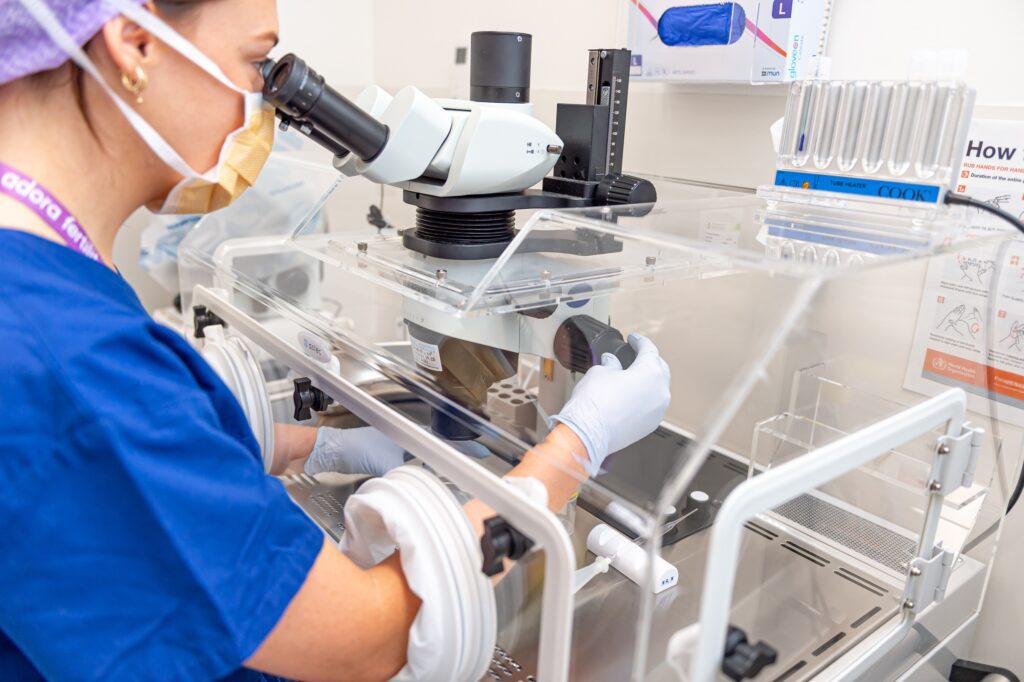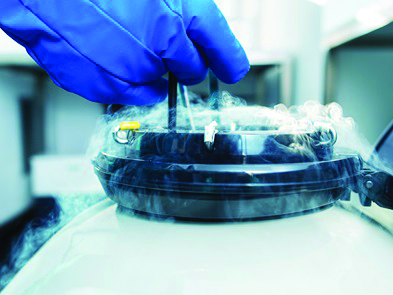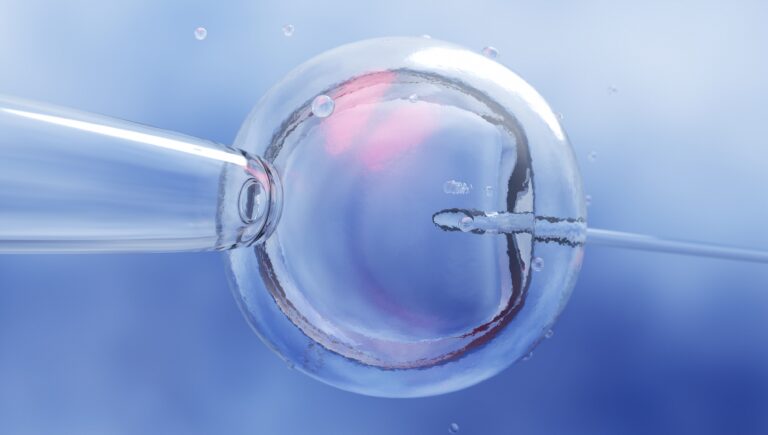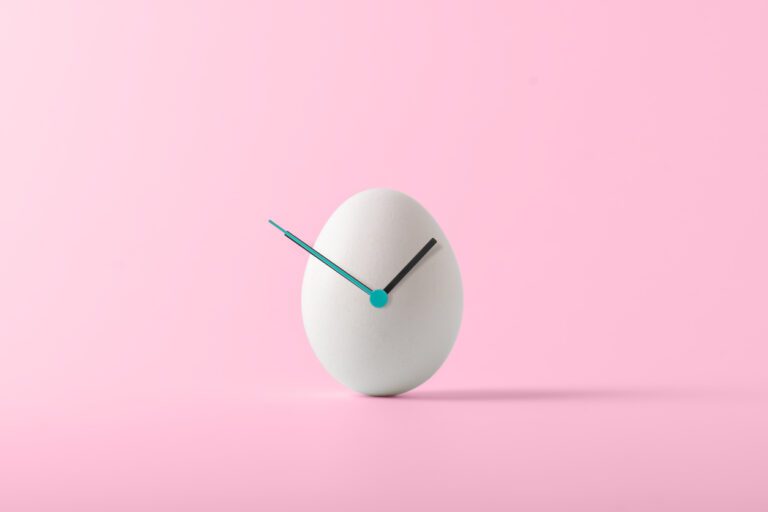Egg Freezing Facts

Ten egg freezing myths busted
Are you considering freezing your eggs? With so much information on clinic websites, chat forums, and social media, it’s hard to get a clear picture of what fertility preservation involves. To help clear up the confusion, we’ve compiled 10 of the most common misconceptions about egg freezing and given you the essential facts. Covering everything from age limits and Medicare funding to the actual steps of the egg freezing process.
As the egg freezing experience and advice may vary between specialists and clinics, please note that this blog reflects the combined views of experts at Adora Fertility.
Egg freezing is a popular service that allows women to try for a baby in the future using eggs that have been retrieved and stored now. There are many benefits to egg freezing. You are able to overcome the natural decline in fertility due to age by preserving eggs from earlier in life when egg quality is higher. For those women facing fertility-affecting medical treatment or conditions, egg freezing provides the opportunity to still try for a family.
But is it right for everyone? And does it always work?
Let’s examine some of the most common egg freezing misconceptions and the truth behind them, so you can make clear and informed decisions about your fertility future.
Myth 1: “All women can freeze eggs”
Egg freezing is a viable option for many women, but it is not suitable for everyone. The main reason egg freezing may not be appropriate for you is your age.
Your age is the primary factor dictating egg freezing success. Although your AMH (Anti-Mullerian Hormone) and follicle count results give us a rough understanding of how many eggs you have left – also known as your ovarian reserve – these tests do not tell us anything about egg quality.
No test can accurately determine the quality of your eggs. This is why age is used as a reliable indicator, as natural fertility—and egg quality—generally declines from your mid-30s onwards. So, if you are older when you undergo egg freezing, you are more likely to have poor outcomes, such as fewer eggs to freeze (if any), eggs that do not survive the freeze/thaw process, or eggs that do not fertilise successfully.
Your Fertility Specialist will discuss your suitability for egg freezing based on your age, future family plans, and ovarian reserve test results. Your Adora Fertility Specialist will not recommend egg freezing if it is unlikely to be successful.
Myth 2: “There is no age limit for egg freezing”

Egg freezing is generally not advised for women over the age of 40. This is because, as mentioned, egg freezing outcomes are likely to be poor. However, at the other end of the scale, if you freeze eggs when you are in your 20s – when your fertility and egg quality are much higher – you may never need to use them, as you still have plenty of time to try for a family before egg quality starts to decline.
So, when is the best age to freeze eggs? Adora Fertility Specialists recommend the early 30s as the optimum time, considering egg quality at this age and the likelihood of using them in future treatment. But it all depends on your individual circumstances. You may be better off freezing eggs sooner for example, if you have specific family planning goals, a condition, or need medical treatment that will affect your fertility.
Myth 3: “Egg freezing guarantees a baby”
Egg freezing itself is a very successful process, with egg survival rates of up to 97%1 thanks to modern freezing methods. But despite the advancement of reproductive technology, it does not guarantee a baby.
It’s important to realise that there are several factors that affect whether those eggs you have frozen will result in a live birth.
Your chances of future pregnancy using your frozen eggs depend on things like:
- Your age and health at the time of freezing (and therefore the health and quality of your eggs)
- How many eggs survive the freeze/thaw process
- How many eggs successfully fertilise through ICSI (Intracytoplasmic Sperm Injection)
- Whether your fertilised eggs become viable embryos
- Whether the embryos implant successfully for pregnancy
So, it’s essential to manage your expectations. Fertility preservation is not a fail-safe guarantee but a backup that allows you to try for a baby in future when natural conception may be more complex due to age.
Future treatment using those eggs can be very successful – a recent US study based on 15 years of egg freezing outcomes revealed that 70% of women who froze eggs when they were younger than 38 – and thawed at least 20 eggs for treatment – had a baby, with many able to have more than one child2.
Myth 4: “Egg freezing is bad for your fertility”
Egg freezing does not harm your natural fertility or reduce your ovarian reserve. This is because of how the fertility medications used for egg freezing work. Each month during your menstrual cycle, you have several immature eggs ready to mature, but usually, only one matures and is released for fertilisation. The fertility medications simply mature all the eggs that are part of your normal monthly cycle. So, egg freezing does not take away any eggs from your supply or affect your chances of pregnancy in the future.
Occasionally, women can have complications from the egg collection procedure. Although rare it is important to note that infection or scar tissue can result from these complications which could reduce your chance of natural pregnancy in the future.
Myth 5: “Egg freezing is painful and difficult”

The egg freezing process is not painful or complex and can be completed in just a few weeks. The first step is self-injecting fertility medications to mature your eggs for freezing. These injections are easy to do, and your Adora Fertility nurses will show you how. Once your eggs have matured and are ready for retrieval – which we check through an ultrasound scan – you are booked in for the egg collection procedure. This is performed under heavy sedation to the point of being unaware of the procedure. Some women may feel slight discomfort afterwards, but this is normal. We will be able to tell you straight away how many eggs were successfully retrieved for freezing, and you should be able to return to your normal activities the following day.
The side effects of egg collection are related to how many eggs are collected. If you have high numbers collected, e.g. 20 eggs, you may feel a lot more bloated and have more discomfort the day after the egg collection. Some women who have had high numbers collected may not feel well enough to return to work the day after the procedure. Women who have a medical condition such as endometriosis, may also have more discomfort after the egg collection.
Myth 6: “You only need one egg freezing cycle”
The average number of eggs retrieved in an egg freezing cycle is six to eight, so multiple cycles are usually needed to ensure you have plenty of eggs for future use. How many cycles you need depends on factors such as your age. Predictive model data, for example, has shown that a 37-year-old woman would need to freeze double the number of eggs as a 34- year-old woman to have the same likelihood of a live birth3. Studies have also shown that women who freeze more than 15 eggs have a significantly higher live birth rate, showing that freezing more eggs increases the chance of a live birth4.
Your Fertility Specialist will advise how many cycles you need based on your individual circumstances, to maximise your chances of future pregnancy.
Myth 7: “Frozen eggs are poor quality”

Freezing eggs does not compromise their quality or ability to produce a pregnancy and live birth. Randomised studies have shown no difference in fertilisation rates between frozen and fresh eggs, with similar embryo quality5. This is thanks to the modern freezing methods that clinics now use, which ‘fast freezes’ eggs without cell damage.
Myth 8: “Frozen eggs must be used within a few years”
Eggs can safely remain frozen for many years without any deterioration. Under UK law, for example, eggs can now be frozen for up to 55 years!6 In Australia, the length of time you can store eggs varies between states and territories. It is usually around 10 years.
Myth 9: “Egg freezing is never covered by Medicare”
Medicare may help to fund egg freezing in certain circumstances. Whilst electively freezing eggs for social or family planning reasons is not covered by Medicare, if you’re freezing eggs because of medical reasons – such as having a severe fertility-affecting condition or needing chemotherapy – a Medicare rebate may be available which will reduce your out-of-pocket costs for your cycles. Your Fertility Specialist will be able to advise you.
If Medicare does not cover egg freezing in your instance, costs vary from clinic to clinic. There are also ongoing storage fees. Approximate egg freezing costs at Adora Fertility can be found here.
Myth 10: “Egg freezing is an easy decision”

Egg freezing may seem like the answer to delaying having a family, but as we’ve highlighted in this blog, it is not a guarantee. It’s essential that you clearly understand what egg freezing does and does not do and consider how you might feel if it doesn’t work out – you may not get many eggs to freeze, or your eggs may not fertilise or result in high grade embryos. Because egg freezing can be an emotional experience – just like any type of fertility treatment – all Adora Fertility clinics have counsellors available who can address any concerns or worries you have about egg freezing so you can start your cycle with confidence and clarity.
Find out more about egg freezing
Explore more about egg freezing and the process here or get your free copy of our
comprehensive egg freezing eBook here. To find out if egg freezing is an option for you, book an appointment to see one of our Fertility Specialists for impartial, no-obligation advice.
Sources:
- Mature oocyte cryopreservation: A guideline
https://www.fertstert.org/article/S0015-0282(12)02247-9/fulltext - NYU Langone Health: Frozen eggs more efficient option than in vitro fertilization for women starting families later
https://nyulangone.org/news/frozen-eggs-more-efficient-option-in-vitro-fertilization-women-starting-families-later - Predicting the likelihood of live birth for elective oocyte cryopreservation: a counselling tool for physicians and patients
https://academic.oup.com/humrep/article/32/4/853/2968357 - Outcomes of social egg freezing: A cohort study and a comprehensive literature review
https://www.ncbi.nlm.nih.gov/pmc/articles/PMC10342811/ - Comparison of concomitant outcome achieved with fresh and cryopreserved donor oocytes vitrified by the Cryotop method
https://pubmed.ncbi.nlm.nih.gov/17889865/ - Human Fertilisation & Embryology Authority (HFEA): New law comes into force giving greater flexibility for fertility patients
https://www.hfea.gov.uk/aboutus/news-and-press-releases/2022/new-law-comes-into-force-giving-greater-flexibility-for-fertility-patients/



